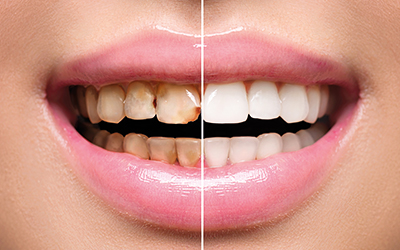


Dental decay occurs when enamel and dentine are gradually dissolved as a result of sustained acid attack, which takes place after eating and drinking anything containing sugars. Over time, the acid damages the tooth and may lead to it needing to be filled or even taken out.
But it’s not just sugars that are harmful, various types of foods and drinks react with plaque and form acids and particularly having sugary snacks or drinks between meals can increase the risk of decay, because your teeth come under constant attack and do not have time to recover.
In the early stages of dental decay there are usually no symptoms, which is why having x-rays taken during regular check-ups is so important as these enable your dentist to spot the early signs of decay.
If left untreated, the cavity will reach the dentine and your tooth may become sensitive, particularly when you have hot foods and drinks and as the decay gets nearer the tooth pulp you may suffer from toothache.
If the decay is not too serious, your dentist will be able to remove all the decay and repair the tooth with a filling. Sometimes the nerve in the middle of the tooth can be damaged and if this is the case we may need to carry out root canal treatment and then repair the tooth using a filling or a crown.
If the tooth is badly decayed the only alternative may be to have the tooth taken out.
Of course brushing your teeth regularly and if possible after eating will help you avoid tooth decay. If this is not possible, chewing sugar free gum will help stimulate saliva which neutralises the acid in your mouth and prevent damage. Minimising the number of times you eat between meals will also help. Routine check ups and having x-rays will also allow us to see whether there is any early signs of decay present in your teeth.
Unfortunately in the early stages tooth decay has few symptoms. The first sign is often some sensitivity when eating hot or cold foods. As the decay gets closer to the pulp of the tooth you may begin to suffer from toothache.
If the decay is not too serious we will be able to remove it and fill the tooth – usually with a tooth-coloured filling. If the decay is more advanced we may need to perform root canal treatment.
| Monday | 9:00am – 6:00pm |
| Tuesday | 9:00am – 6:00pm |
| Wednesday | 9:00am – 7:00pm |
| Thursday | 9:00am – 6:00pm |
| Friday | 9:00am – 5:00pm |
| Saturday | Monthly |
| Sunday | Closed |